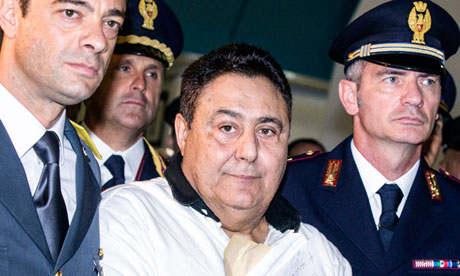By Erica Smith
Impunity Watch Reporter, Africa
DAKAR, Senegal – Senegalese authorities have charged former Chad dictator Hissene Habre with war crimes, crimes against humanity, torture and genocide. Habre was president of Chad from 1982-1990 and has lived in exile in Senegal for 22 years.

Habre is accused of personally overseeing a system of oppression and using his police force to attack and terrorize perceived enemies. He is also accused of overseeing more than 40,000 political killings, systematic torture and other human rights violations. “Widespread systematic attacks were ordered against civilian populations. In this context, what followed was torture and detention followed by summary executions suffered by prisoners and political detainees,” The court’s attorney general, Mbacke Fall, told Reuters.
Habre left a meticulous and large paper trail behind him when he was deposed in 1990. A Human Rights Watch researcher, Reed Brody, discovered the political police forces archives in their former offices in 2001. The documents mention more than 12,000 victims and also indicate that Habre received direct information about 900 detainees. “What these documents make very clear is that Hissene Habre was kept informed of virtually everything, from the cloth being used for uniforms to the deaths of prisoners,” Brody told the Associated Press. “What we see here is a control freak, really, who was keeping on top of every detail.”
A special court was set up in Senegal, after pressure from the International Court of Justice and an agreement with the African Union, to look into the allegations against Habre last December. Habre was also indicted for alleged crimes against humanity in 2000 but little action was taken on the case under the government of former Senegalese president Abdoulaye Wade.
Habre’s defense team has claimed that the charges are political. They are quick to point out that the court’s highest donor is Chad’s current government run by Idriss Deby, who deposed Habre in 1990. “I think these are the false allegations of President Deby,” Mohammed Ali Tidiane, Habre’s nephew told the AP. “Deby is afraid of Habre. He knows that it’s Habre who liberated Chad from the arms of Gadhafi.”
Habre will be brought before the court’s judges for the confirmation of the charges on Tuesday.
For further information, please see:
Washington Post — For 2 decades, deposed Chad dictator lived luxurious life in Senegal but now must stand trial — 6 July 2013
Aljazeera — Ex-Chad leader charged over war crimes — 2 July 2013
Reuters — Ex-Chad leader Habre faces war crimes charge: prosecutor — 1 July 2013
Voice of America — Former Chad Dictator Faces Charges of War Crimes — 1 July 2013



